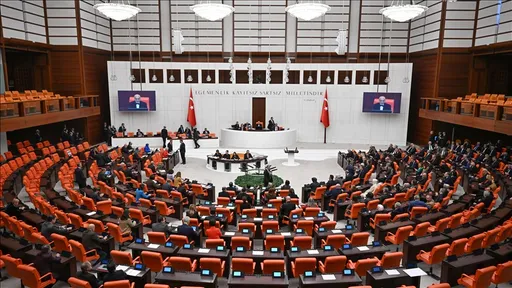By Nuri Aden
Ahmed Naji Sa'ad, the Somali music icon who passed away in London on September 6 at age 84, was more than just an artist who wore the halo of greatness as a singer, composer, musician and poet.
Naji, aka Al Ustad, was in many ways a bridge between the past and present – straddling generations of musical, national and political evolution and, in the process, endearing himself to young and old alike.
He preached peace, advocated reconciliation, and whenever the opportunity to use his voice to inspire nation-building presented itself, he never hesitated.
"Everyone who sent their condolences told us the same thing — that it's not just about us losing our father. They felt the same sense of loss because he was a father figure to them too," Abdalla Ahmed Naji, one of the maestro's ten sons, tells TRT Afrika.
Abdirashid Mohamed, a Somali writer, sees Naji as a unifying factor when his native country needs healing.
"Fellow artists across generations loved and forged links with him. He played a huge role in creating unity in Somalia, taking part and performing at the Djibouti peace talks in Arta," he recalls.
"At the talks, he used his music to remind Somali leaders that Somalia's cause was bigger than their ego and specific interest. As the politicians argued, he was the voice that reconciled them. He unified Somalia through the beats of his music even as the gun barrel divided them."
Turkish tribute
In the true traditions of an artist without boundaries, Naji composed and sang a special song dedicated to Türkiye and Turkish President Erdogan during the latter's historic visit to Somalia at the height of the deadly drought that had struck the African country.
As the first non-African leader to visit Somalia since the civil war, President Erdogan received one of Naji's most heartfelt tributes from a celebrated artist to a visiting head of state.
"President Erdogan, we thank you very much. The Turkish government and its people have left us an unforgettable history. They brought us humanitarian support, and we will never erase from our memory this unforgettable act of goodness," so goes the lyrics of Naji's song.
Multifaceted personality
Born in the Somali capital, Mogadishu, Naji had a flair for languages. He was fluent in Italian and Arabic and developed the ability to sing with such extraordinary feeling.
In 1962, the Somali administration recognised his talent by enlisting him in the state-owned Radio Mogadishu.
''It is impossible to summarise his contributions to Somalia or even pay tribute to him," says fellow artist Mohamed Noor, who performed with Naji.
"Our relationship with him started with my father, who made him head of Radio Mogadishu Music. He was multi-talented – a producer, creator, composer, and someone with a deep connection to Somalia. During the war, together with his sons, he formed a band in Yemen to espouse the cause of Somalia."
Home return
Before joining Radio Mogadishu, Naji would sing songs about freedom and the liberation struggle with Mogadishu-based bands such as Shareero.
Part of who he became as an artist was shaped by his experience of seeing different versions of the nation — pre-colonial, post-colonial, military rule, and a prolonged civil war that was overcome with resilience.
Throughout Somalia's history, Naji used his music and deep understanding of Somali culture and ethos to call for unity, counter division and tribalism, and encourage the spirit of patriotism.
After two decades of living abroad, his return to Somalia in December 2011 was marked by jubilation at Mogadishu's Aden Adde airport by hundreds of Somalis who had welcomed him home.
Even when seeking refuge abroad following the collapse of the central government in Somalia, Naji never abandoned the Somali people or stopped composing and singing songs about Somalia in the throes of instability.
Unfulfilled dreams
The Somali people reciprocated with their unconditional love and admiration. To many, Naji's return was more than an artist revisiting his roots — it reignited the candle of peace in a city that had been through a lot.
"Naji was back in Somalia not to enjoy the summer sun at the pearl of the Indian Ocean but to spearhead the revival of Somali music and arts that had been affected by the civil strife. He organised meetings, training, and awareness rallies across the country," recalls Abdirashid.
Some tracks that captured hearts include Eebow Unukoo Nabadaa and Gaarida Baarida Haween.
“He took this route in his music career because he was inspired by the vision for a Somalia with a stable government, and a Somalia where brothers would stop killing each other and stay united," Abdalla Naji, another of the icon's sons, tells TRT Afrika.
"He desired peace more than anything else. Our father dreamt of a strong Somalia but, sadly, didn't live to see it."
Inspiration for generations
Naji drew inspiration from Qasim Hiwle and Mohamed Jama Joof, both pioneers of Somali music. He also admired Sufi Ali, Fatumo Kiinya Fatumo Hirad and Khadija Abdullahi Dalays. He, in turn, inspired scores of other artists in the following decades.
By the time of Somalia's independence, Naji was in his early twenties, and his success was meteoric.
Long before, he collaborated with artists from the North, such as Abdullahi Qarshe, Hussein Aw Farah Dubbad, Ahmed Ali Haroun (Dararamle), Osman-Gacanlow, and others. Some of these men helped Naji build the vocabulary of music and literature.
"My father had a penchant for assembling talent. Whenever he saw promising Somali artists, he would extend a helping hand to fulfil their dreams of becoming either a singer or a musician," recounts Abdalla Naji.
Heart of Somali art
The famous Somali singer Maryan Mursal attests to this. "Naji helped me get employed by the then-Somali government when I was only 16. I became a national-level singer, and it was all due to Ahmed Naji Sa'ad, who helped me tremendously," she tells TRT Afrika.
Naji was also one of the founders and pioneers of the Waberi National Band, which toured the world. He would be routinely called upon to organise entertainment during key government events such as the Independence Day celebrations.
Not surprisingly, Naji's demise plunged Somalia into national mourning.
President Hassan Sheikh Mohamud and Prime Minister Hamse Abdi Barre were among the leaders who expressed their condolences to the deceased artist's extended family and the Somali people in general.
"The deceased was the heart of Somali art, especially the Waberi National Choir," Somalia's Ministry of information said in a statement.
Naji's legacy lives on through his 16 children, some of whom are established artists. But all of them acknowledge that filling the void he left will take some doing.
























